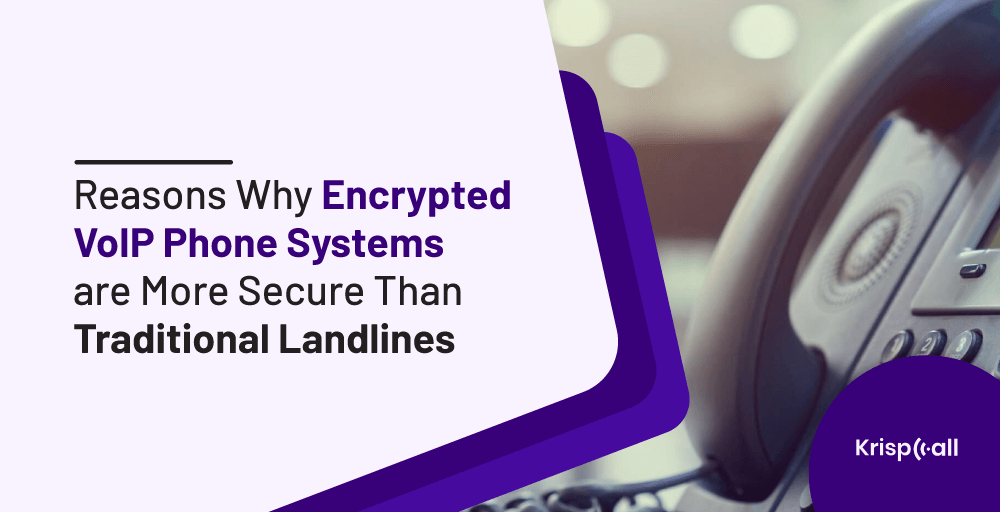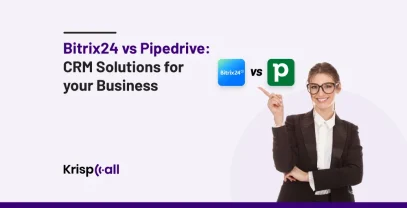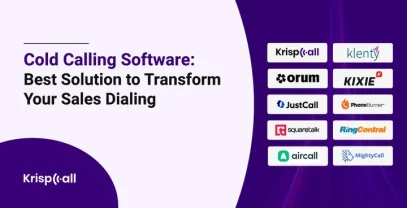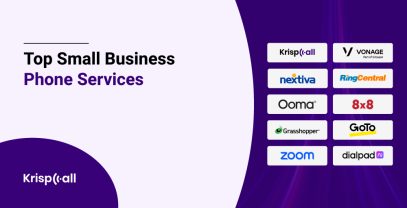The business environment of today looks very different from what it did a few decades ago. 👀
With many organizations shifting to remote work in today’s time, security has been the utmost concern of enterprises. Since employees are working from different geographic locations, monitoring all their activities can be far-fetched.
On such occasions, protecting important data and information has been a complex task to achieve. In fact, enterprise data security remains the top priority for every organization, no matter what work culture they follow. 🔒
That’s when you need encrypted VoIP phone systems.
🔑 KEY POINTS
- The best way to compare VoIP and landline phone systems is to consider their features
- VoIP incorporates an end-to-end encryption feature that makes your system much more secure than the traditional landline phone.
- If you prioritize privacy and want fewer complications, go for the VoIP phone system like KrispCall.
This blog provides you the key insights on why VoIP is a worthy alternative to landlines in terms of risks and security.
VoIP phone system Vs Traditional landline phone system
In simple words, VoIP is a technology that uses an internet connection for making calls. According to the research, over 60% of organizations with landline telephones migrate to VoIP telephone systems when their landline telephone contracts end.
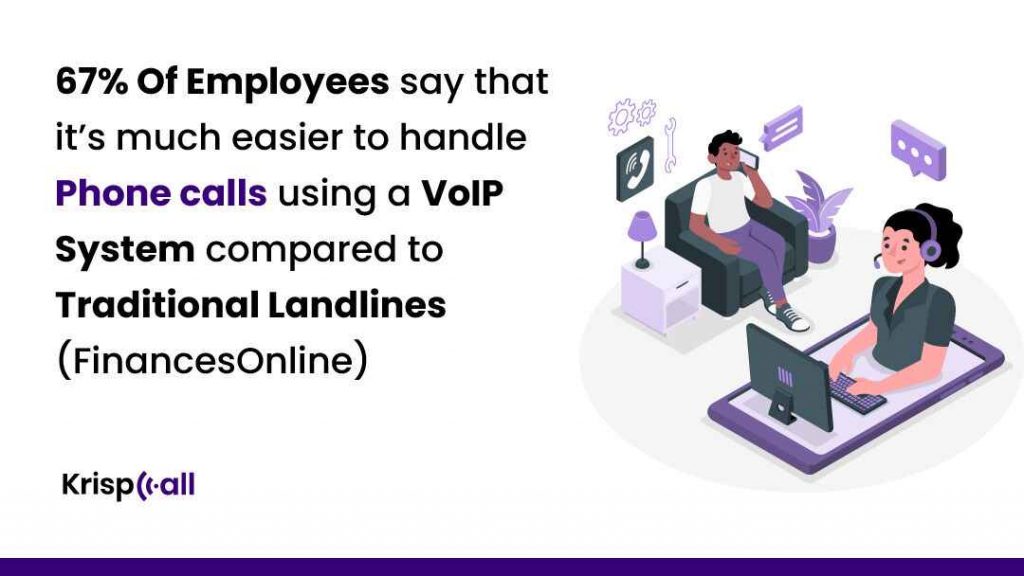
Similarly, a report by Business Wire suggests that the VoIP market is forecasted to reach approximately $183.7 billion by 2027.
The best way to compare VoIP and landline phone systems is to consider their features. Below is a table that lists some of the top VoIP features that favor VoIP phone systems over traditional landline phones.
| Features | VoIP | Traditional landlines |
| Internet Calls | Yes | No |
| CRM Integrations | Yes | No |
| Call Encryption | Yes | No |
| Ease of Setup | Yes | No |
| Call Recording | Yes | Hardware must be purchased separately |
| Caller ID | Yes | Yes |
| Call Monitoring | Yes | Limited |
| Call Waiting | Yes | Yes |
| Setup Cost | $0 | Based on the service provider |
| Interactive Voice Response | Yes | No |
| Call Analytics | Yes | No |
| Voicemail to Email | Yes | Yes |
VoIP Vs Landline: Risks
Though the benefits of VoIP over traditional landlines are immense, VoIP can be vulnerable to different types of risks. In VoIP technology, the voice data is converted into tiny packets of digital information that are transmitted over the internet through your home connection.
Therefore, its security depends on the security measures your provider has in place. Here are potential risks associated with both VoIP and landlines.
1. Cyberattacks
It is possible for hackers to access any online data transmission. You may be more vulnerable to hackers if your VoIP provider doesn’t have robust security measures in place. An attacker can listen in on a confidential conversation in real-time and intercept calls. Similarly, they can also steal older phone calls recorded and archived for business use.
You can also suffer network damage from DDoS attacks. Hackers can attack your servers and overwhelm the system with millions of requests. Consequently, your servers go down because they cannot handle the load, possibly bringing your business to an end.
On the other hand, traditional Landlines, due to its analog nature, are less susceptible to cyberattacks because they have a simpler digital setup.
2. Government surveillance
VoIP providers, similar to landline phone providers, are subject to allow access to law enforcement to listen to phone conversations. If an appropriate warrant is obtained, law enforcement may conduct electronic surveillance in accordance with these regulations.
While VoIP can be vulnerable to interception, you have numerous options as far as VoIP security is concerned. Luckily, some VoIP service providers, like KrispCall, incorporate features like end-to-end encryption of voice data. You just need to make your move carefully.
Get Encrypted Phone System For Reliable Communication
Get encrypted phone numbers with feature-rich services for personal and business use in over 100+ countries at the most affordable price.
Select numbers :
3. Infrastructure Dependency
VoIP depends on a reliable internet connection. It is prone to errors like delay or packet loss during high internet traffic periods.
While landline is vulnerable to physical harm, like line cuts or damage to telephone poles, and disruptions caused by natural disasters or accidents.
4. Emergency Services
VoIP may not quickly provide exact location to emergency services, causing potential delays due to the absence of a specific physical address.
Traditional landlines give fast and effective emergency response by providing automatic location information to emergency responders.
VoIP vs Landline security
VoIP incorporates an end-to-end encryption feature, which means encrypted VoIP makes your system much more secure than the traditional landline phone which lack advanced encryption features. Let’s have a detailed look at how you can have a better tool to protect it.
1. VoIP Vs Landline: Encryption Technolgy
Having your business phone system encrypted means it is your innate immune system against any unauthorized use. With encrypted VoIP, hackers cannot intercept your confidential data in the first place. Even if they do, they can never understand what you are saying.
It means your privacy and security go hand in hand with an encrypted VoIP system. Additionally, all calls are encrypted between both ends so that no one can find out extra information about the callers, such as their names or locations.
Landlines, while may lack modern encryption.
2. Multi-factor authentication
Multi-factor authentication is a reliable way to increase your security. The authentication system enhances your security by forcing users to go through two forms of identification in order to log in to the system.
VoIP systems already need the login credentials of each user that enable them to connect through business telephone. The introduction of multi-factor authentication further creates a layer of security, making it more difficult for unauthorized users to access networks or databases.
While, traditional landlines may have fewer multi-factor authentication options, focusing more on physical security.
3. Calls and access log monitoring
Although call logs are helpful for sales purposes, it’s also helpful for various other reasons. With these logs, you can easily see whether your VoIP phone system has been hacked. Monitoring your call logs regularly gives you a sense of what “normal” looks like. It is possible to detect any anomalies before your call limits are triggered – even before a hack is detected.
Likewise, an access log will show who has accessed your VoIP system. You’ll spot an intruder if you notice an unusual IP address or see that your administrator signed in at an unusual time.
Traditional landlines include basic call records with limited real-time monitoring.
4. Protection against social engineering attacks
Social engineering attacks involve human interaction (social skills) to gain information about a computer system or an organization.
Attackers may appear innocent and respectable, offering credentials to support their claim to be an employee, repair person, or researcher. A strong VoIP provider has a good security practice and a plan of action for such situating ions. All you need to do is choose the right provider.
5. Segregation of network into VLANs
A physical network can be divided into a number of separate virtual networks creating another layer of security for business enterprises. Using a separate network, you can restrict all VoIP traffic.
The use of VLANs can also improve troubleshooting. If any day your phones are not working, you know instantly which network to examine. This means you won’t have to waste time checking routers and other infrastructure.
Traditional landline systems usually don’t use VLAN-type segmentation because they are analog and focus more on physical security. They have specific telecom methods to ensure reliable voice communication.
6. Use Virtual Private Network
VPNs are a very common feature of computer networks in companies. VoIP VPNs are secure and encrypted tunnels built over the internet that send VOIP traffic to and from the internet.
By using a VPN to encrypt your internet connection, you will be able to keep your VoIP conversations safe against unauthorized parties such as hackers and others who monitor your online activity. Further, having your traffic encrypted will protect you from mass surveillance and analysis by commercial organizations and governments.
Traditional landlines, being analog, may face challenges integrating VPN technology seamlessly, unlike digital systems such as VoIP.
Conclusion
VoIP is a more reliable and modern way to make and receive calls than the traditional phone system. But you need to use extra security measures when you store everything in the cloud. In the meantime, adding security is often a costly proposition. Of course, encryption increases your security but also takes up more network bandwidth.
If you prioritize privacy and want fewer complications, go for the VoIP phone system like KrispCall which is affordable, safer and encrypted to secure business communications.
FAQ
What are the advantages of encrypted VoIP phone systems?
The advantages of encrypted VoIP phone systems are:
- Encrypted VoIP phone systems establish private and secure voice communication.
- The data remains unchanged, preventing scams.
- Makes difficult for others, including hackers, to listen in on conversations over public networks.
- Reduces the risk of impersonation by verifying the caller’s identity.

